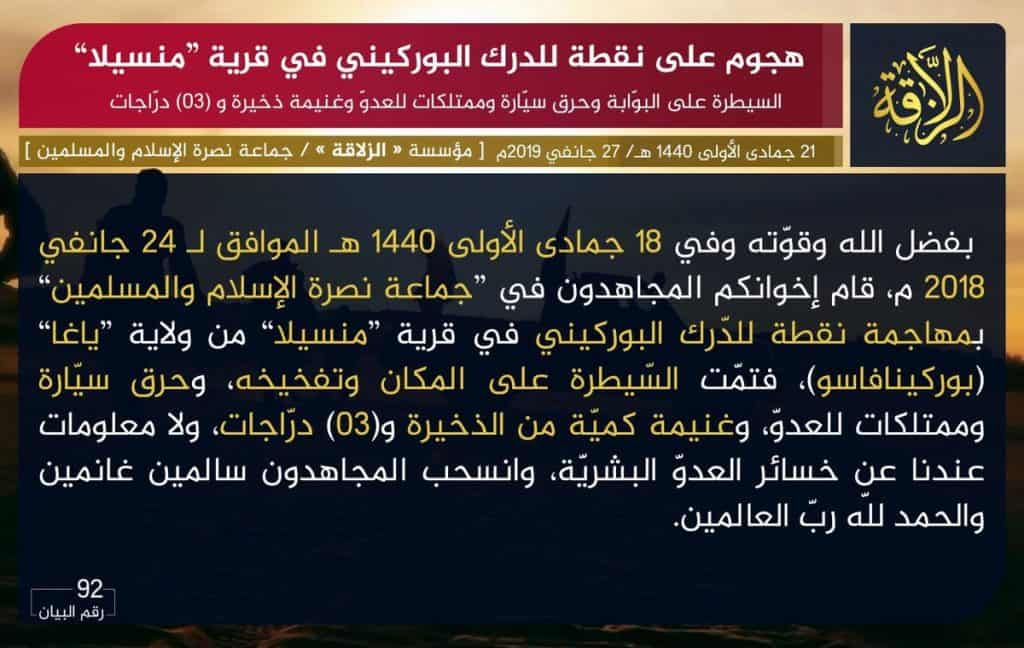
Over the past few days, al Qaeda’s Group for Support of Islam and Muslims (JNIM), which operates within West Africa and the Sahel, has claimed several deadly attacks in both Mali and Burkina Faso.
Within a span of week, the jihadist group claimed seven attacks on Malian and Burkinabe military targets, as well as local militia groups.
On Jan. 21, JNIM claimed its forces targeted a Malian military convoy that allegedly contained Dozo [traditional hunters] militiamen near Toye in the Segou region. Local media has reported at least one Malian soldier was killed, while one vehicle was captured.
This is not the first time JNIM has claimed targeting the Dozo, as it has long accused the Malian government of favoriting the Dozo over the Fulani in central Mali.
On several occasions, JNIM has directly intervened on behalf of the Fulani in communal violence. In July 2018, the UN documented at least five cases where the JNIM took part in communal violence in that month alone. Almost a year earlier shortly after JNIM’s founding, it also claimed to have taken part in clashes between Fulani and Bambara militias in central Mali.
Additionally on Jan. 21 in central Mali, the jihadist group also said its men detonated a landmine on a Malian military convoy near Kouakourou in the central Mopti region. In the same statement, JNIM claimed a Jan. 22 landmine explosion on Burkinabe troops near Djibo near Burkina’s borders with Mali.
Two days later, JNIM said its men targeted Malian military convoys near Boni, also in central Mali, with two separate IED attacks on Jan. 24. The terrorist group also claimed the Jan. 25 IED ambush on Sri Lankan peacekeepers near Douentza in central Mali. At least two Sri Lankan troops were killed in that attack.
On Jan. 27, it also said it was responsible for a complex attack on a police station in Burkina Faso’s eastern Yagha Province.
While yesterday, a Malian base was subjected to a complex attack in the town of Tarkint in Mali’s northern Gao region. According to local media, a suicide car bomb was used in this attack. This assault has not been claimed as of the time of publishing, but it was most likely the work of JNIM.
This reported suicide bombing comes just a little over a week after a similar attack on a UN base in Aguelhok in the northern Kidal region. That assault was later framed by JNIM as being part of a wider battle with Israel.
JNIM has been able to continue its wave of violence, even expand its operations, within Mali as violence has largely shifted to the country’s central regions. At the same time, it retains the ability to strike in the country’s north.
Violence in Burkina Faso, mainly concentrated in the north near the Malian borders, has been increasing exponentially since late 2016. This violence has mainly been propagated by JNIM and its local affiliate Ansaroul Islam.
At the same time, jihadist violence has been spreading further into Burkina’s southeast. As noted by ACLED researcher Héni Nsaibia, this violence is mainly due to the two aforementioned jihadist groups and the Islamic State in the Greater Sahara.
These attacks show that JNIM continues to be resilient in the face of Malian troops, Burkinabe forces, a French-led counterterrorism mission, a UN peacekeeping force, and a deployment of troops from the G5 Sahel.







